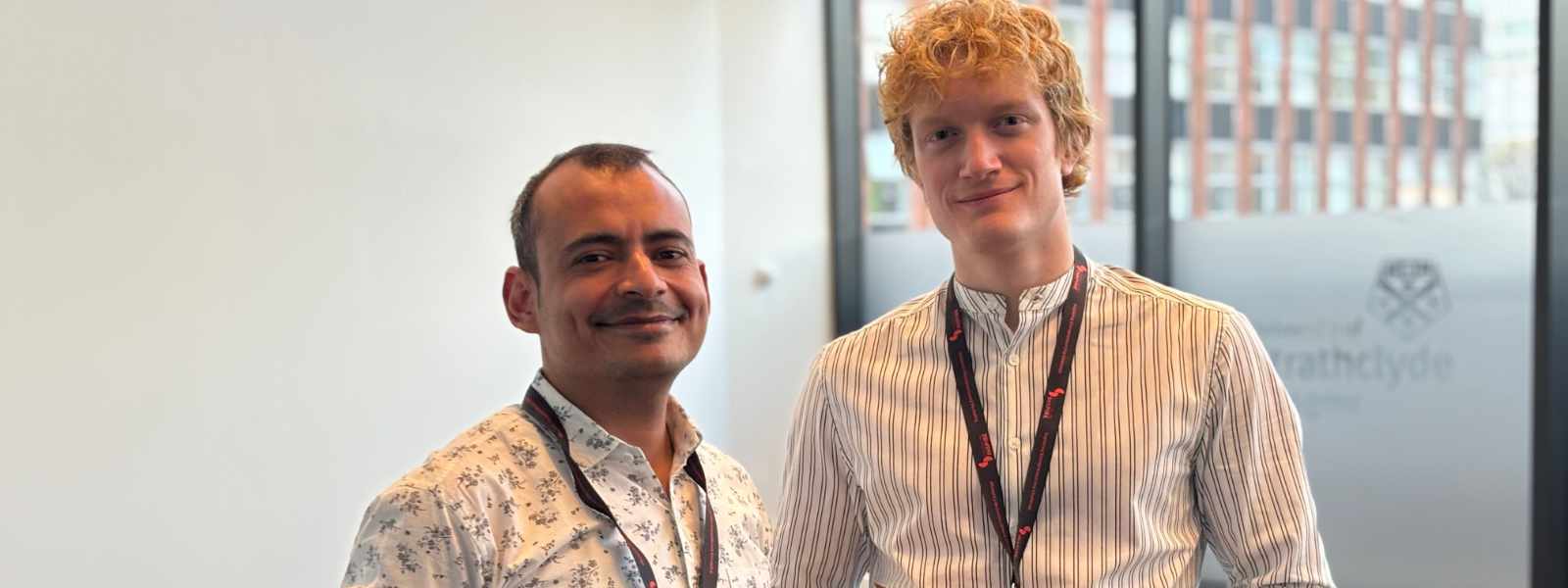
An idea to create an easily recognisable mark of sustainable and ethical manufacturing has taken top prize at a Strathclyde pitching contest.
The ‘Ecofy’ team were awarded £2,000 at the University’s live pitching event for students, the Exploring Entrepreneurship Challenge (EEC).
The team of two emerged as winners from among six student finalist teams, with their idea to cut through green washing and confusing messaging in order to enable consumers to make planet-positive purchases.
Entrepreneurial mindset
The Exploring Entrepreneurship Challenge is the University’s flagship experiential learning programme for developing the entrepreneurial mindset of students across all subjects and stages of study. Developed by Strathclyde Inspire in partnership with the University’s Centre for Sustainable Development, it is part of an award-winning Entrepreneurship for All approach that empowers students to develop key skills to enhance their employability.
Students took part in a mix of online and in-person learning experiences as they faced the challenge of creating an idea that would address a UN Sustainable Development Goal. In the process, they gained skills of forward-thinking, collaboration, and resilience, helping them to unlock their potential, whatever their ambitions for the future.
Finalist team ideas ranged from an AI-powered platform designed to match talented students with scholarships tailored to their strengths and financial needs, to a personalised support system to help university researchers perform at their best by enhancing mental clarity and preventing burnout.
The winning team members were Shubham Agarwal and Gabriel Szeiler. Their idea connects to the UN Sustainable Development Goal 9, which aims to build resilient infrastructure, promote inclusive and sustainable industrialisation and foster innovation.
Sustainable operations
Gabriel, who studies Design, Manufacturing and Engineering Management, said: “I think that everyone has the ability to make change in the world if they apply themselves to it. We want to promote sustainable and ethical manufacturing in Scotland by offering accreditation. We’d look into supply chains and assess how sustainable operations are, and then products or companies meeting appropriate standards could have an easily recognisable logo that consumers could use to identify that product as sustainable.”
Shubham, who is studying for an MBA, said: “It was really important to reach out to people in industry to get their input. Being motivated by the supporters throughout, it’s been quite a journey. We learned about motivation, resilience, and the talks that Strathclyde Inspire put on were really helpful in crafting our final pitch.
Personally, I think that entrepreneurship means turning your thoughts into reality.
“It could be something as simple as the way of working at your corporate job. You could be entrepreneurial in a start-up; you could be entrepreneurial in a café; you could be entrepreneurial running your own company. But I think the essence of it lies in the way you think and the way you deliver.”
Stuart Cassells, founder of the world’s most famous bagpipe band, the Red Hot Chilli Pipers, attended the final as an inspirational speaker, sharing his insights on the power of thinking big, being positively adaptable and cultivating connections.
He said: “The teams were incredible. The diversity of the different ideas was fantastic, and it was interesting to note the influence of AI coming through, which I think we will see for lots of ventures in the coming period, so it’s great that young Scottish entrepreneurs are already thinking in that way. There was wonderful support in the room for all of the students and we could see that quite a few of the ideas had good potential – good luck to all of the participants in the future.”